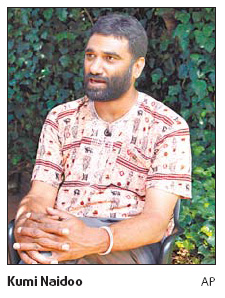Greenpeace chief wants action on climate
An African has taken over as director of Greenpeace, bringing experience honed as a teenage opponent of white rule in South Africa and a network of powerful contacts to the battle against global warming.
Greenpeace was founded 38 years ago by environmental activists who wanted to stop the United States from conducting underground nuclear tests in a region off Alaska that harbored endangered sea otters.
Kumi Naidoo, the new director, said on Monday he still had much to learn about the group's current agenda, from protecting whales and forests to stopping nuclear tests and toxic dumping. But he has already grasped the issues around global warming, an increasingly overriding concern of Greenpeace and other environmental groups.

"We either get it right and all of humanity comes out on the other side with a new world," Naidoo said in an exclusive interview before he took the Greenpeace helm. "Or we get it wrong and all the world is going to sink."
Gerd Leipold, his predecessor at Greenpeace, said Naidoo's appointment is a watershed, both because he is the first African and because he is the first executive director to come from outside the organization.
After battling apartheid in South Africa in the 1970s and 1980s, Naidoo led global campaigns to end poverty and protect human rights. Recently, he has led the Global Campaign for Climate Action, which brings together environmental, aid, religious and human rights groups, labor unions, scientists and others and has organized mass demonstrations around climate negotiations.
"Previously, environmentalism was seen as for the privileged few," said Tasneem Essop, a South African environmentalist who has known Naidoo since their days as student anti-apartheid activists. She said the new Greenpeace chief will help rally other human rights and development workers to the climate cause.
As Naidoo puts it: "If the whole planet is under threat ... what's the point of not addressing that and saying we'll do other development work?"
Naidoo, 44, has fought for the rights of women and children, among the most vulnerable when droughts bring hunger or floods disrupt livelihoods. He has pushed to strengthen international cooperation and ensure the concerns of poor countries are heard when rich nations plan the future.
Naidoo took part in nationwide student protests as a 15-year-old, and by 16 had been kicked out of school for participating in peaceful protests against a system that denied non-whites basic rights and economic opportunity. Greenpeace says he completed his high school studies at home, earned a law degree in South Africa and received a doctorate in political sociology as a Rhodes scholar from Oxford.
Following Nelson Mandela's release in 1990 after 27 years in prison, Naidoo returned from Britain to work for the African National Congress and other anti-apartheid groups.
Naidoo said Greenpeace is committed to dialogue, but knows when to stir people into action and sticks to peaceful means. "Governments, sadly, are unlikely to change as fast we need them to unless they are pushed," Naidoo said.
Greenpeace will be there when negotiators sit down next month in Copenhagen to try to draft an agreement to cut greenhouse gas emissions blamed for global warming.
"Anything short of a binding treaty in Copenhagen must be read as a failure of leadership on the part of the political class," Naidoo said. "We can't change the science. The science is clear. We have to change the politics. If we can't change the politics, then we have to put our energies into changing the politicians."
 0 Comments
0 Comments







Comments